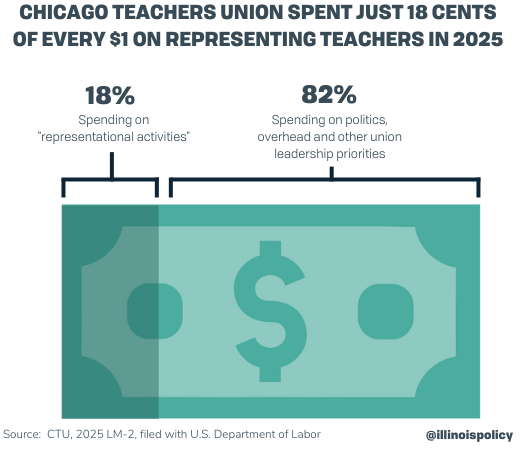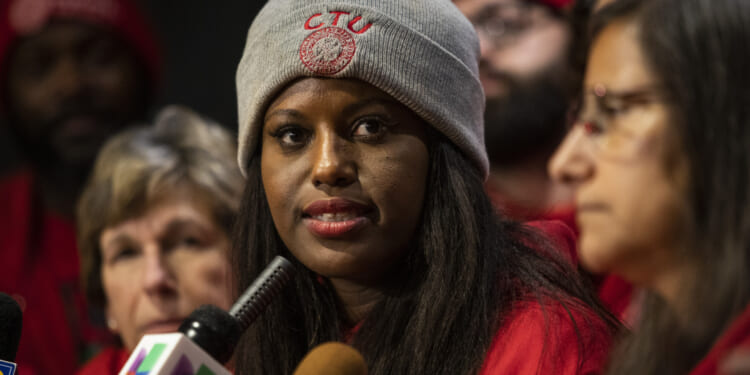Stacy Davis Gates brought controversy, conflict to the Chicago Teachers Union. With her as their president, Illinois Federation of Teachers members can expect the same.
Stacy Davis Gates is now the president of 200 Illinois Federation of Teachers affiliates across the state.
IFT members should be alarmed: Davis Gates’ tenure as Chicago Teachers Union president has caused a major rift between the union and community. According to a 2025 poll, 60% of Chicago voters have an unfavorable view of the union. More than 55% have an unfavorable opinion of Davis Gates herself.
That doesn’t bode well when teachers need community support.
Here are six things teachers should expect as Davis Gates takes control of the IFT affiliates in their districts:
- Secrecy about union spending in violation of internal union rules.
- Increased spending on politics.
- Less spending on teacher representation.
- A financial focus on Chicago and away from downstate affiliates.
- Radical demands in teacher contracts.
- Scandals that overshadow teacher representation .
IFT members, beware.
1) Secrecy about union spending in violation of internal union rules
The Chicago Teachers Union ran its first reported deficit the first year Davis Gate held the presidency. That same year, CTU used member dues to bankroll the election of Chicago Mayor Brandon Johnson without consulting members.
Members’ concerns that CTU is not handling union money properly have yet to be answered, because CTU has failed to release a required annual audit for more than five years.
CTU’s internal rules are clear: the CTU financial secretary is required in union bylaws to “furnish an audited report of the Union which shall be printed in the Union’s publication.” Similarly, the CTU Board of Trustees is to “procure each year, a reliable and adequate audit of the finances of the Union for the preceding fiscal year ending June 30” and announce to members the audit may be inspected in the union office.
But the last audit was released Sept. 9, 2020, and covered through June 30, 2019. Audits for subsequent fiscal years have not been released.
After a demand letter failed to get union action, a group of CTU members filed suit in the Circuit Court of Cook County. The court has already rejected a CTU argument claiming the case should be dismissed, noting CTU “does not even directly dispute” that it is required by its constitution to provide members with an annual audit.
The case is pending. But until the audits are released, CTU’s handling of member money remains suspicious. What is known—through U.S. Department of Labor records—only raises more questions.
2) Increased spending on politics
CTU spending on politics has quadrupled since its fiscal year 2022 report, which included the year before Davis Gates took office as CTU president.
CTU spent over $4.2 million on “political activities and lobbying” in its 2025 fiscal year, according to its recent report. That’s a record high since it started filing federal reports and double its 2024 spending.
Most of that money went to the union’s own political action committees. It funneled $2.5 million to CTU-PAC and an additional $800,000 to PAC Local 1. At least $2.4 million was specifically earmarked for CPS school board races. It also funneled at least $80,000 to Our Schools Action, which is “a coalition of community groups of which the CTU is a member, and People United for Action, which works to elect progressive candidates for public office,” according to Chalkbeat.
3) Less spending on teacher representation
While spending on politics has increased, the percentage CTU spends on member representation has decreased.
Just 18% of CTU’s spending in fiscal year 2025 was on representing members, which the U.S. Department of Labor defines as those activities “associated with preparation for, and participation in, the negotiation of collective bargaining agreements and the administration and enforcement of the agreements.”
The rest was on administration, politics and other union priorities, according to the report the union filed with the U.S. Department of Labor.

To put this in perspective, the Better Business Bureau’s “Standards for Charitable Accountability” maintain at least 65% of a nonprofit’s total expenses should be on program activities.
While the Better Business Bureau tracks spending by traditional charities, CTU’s spending on representing teachers – what should be its core focus – falls far short of this mark.
Prior to Davis Gates taking the lead at CTU, between 19-20% of the union’s spending was on representation. While still not a good record, it has gotten worse with Davis Gates in charge.
4) A financial focus on Chicago and away from downstate affiliates
IFT has affiliates in 200 districts other than Chicago Public Schools. But it already prioritizes Chicago over its other affiliates.
Over 67% of IFT’s spending on affiliates went to CTU in 2024, according to its filing with the U.S. Department of Labor. Since at least 2005, IFT has prioritized CTU over its other affiliates.
Teachers in those other 200 districts should expect that favoritism toward Chicago to continue – or get worse – with Davis Gates leading IFT. She’s already indicated she plans to make CTU’s current focus the focus for IFT statewide.
Davis Gates confirmed her plan to unite all IFT affiliates under the CTU mission umbrella in a recent interview with WTTW. She said CTU “has to have the power to amplify what’s going on all over the state.” With that “power” is likely to go more IFT member dues.
5) Radical demands in teacher contract negotiations
CTU prides itself on demanding social justice and other progressive provisions during negotiations rather than sticking to typical wage and benefit demands. Its mission to put politically motivated provisions in its union contract is part of a broader movement of “bargaining for the common good” – a euphemism for using union contract negotiations to tackle issues such as racial justice, climate justice and immigration at the bargaining table, outside the normal democratic process.
While the strategy was initiated by CTU, it didn’t stay isolated to Chicago. After CTU’s 2012 strike ended, “union leaders planned town halls in other cities across the country, in New York and Cleveland, San Francisco and Tampa, to spread the new gospel” of putting “things on the table that hadn’t been on the table before.”
What might these other 200 IFT affiliates now implement under Davis Gates’ leadership? CTU provides extensive examples. Recent costly and politically-motivated CTU demands included “police-free schools,” cash for asylum seekers and carbon neutrality in the district, among others. CTU also demanded and obtained provisions keeping secrets from parents regarding their student’s preferred gender identity.
While the 200 IFT affiliates may not have seen such demands yet, they should be prepared for Davis Gates to force her “bargaining for the common good” strategy on districts throughout the state now that she’s in control.
6) Scandals that overshadow teacher representation
Apart from questionable spending and member intimidation, Davis Gates is acquainted with scandal in other areas as well.
Those scandals are voluminous, but here are some lowlights:
Davis Gates isn’t exactly a person parents would want their students to emulate.
The bottom line: From secrecy to scandals, Davis Gates’ leadership doesn’t bode well for members of IFT across the state.










